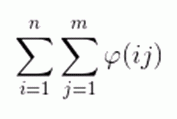题意
求  。
。
其中 \(n\le10^5,m\le 10^9\)。
解法
先开始没有注意到 \(n\) 比较小,拿着柿子就开始硬刚,刚出了这么个脑瘫产物:\(\sum_{i=1}^{n\times m}\varphi(i)d_0(i)\)。
不仅上界那么大,还没有办法用杜教筛(\(\varphi(i)\) 和 \(d_0(i)\) 都没有办法用简单函数 \(f\left(\frac{n}{i}\right)\) 来搞掉)。
不过这里有个结论:
若 \(m\) 的质因子种类包含在 \(n\) 的质因子种类中,那么 \(\varphi(n\times m)=\varphi(n)\times m\)。
证明用欧拉函数的展开式即可。
我们设 \(S(n,m)=\sum_{i=1}^m \varphi(n\times i)\),令 \(n'\) 为 \(n\) 的所有种类质因子的乘积,\(n’'=\frac{n}{n'}\)。那么就有 \(S(n,m)=n''\sum_{i=1}^m \varphi(n'\times i)\)。由于答案是 \(\sum_{i=1}^nS(i,m)\),为了方便算,我们将每个 \(i\) 的 \(i''\) 提出来,将 \(i’\) 代入 \(S\)。
由于 \(n\) 的质因子指数均为 \(1\),所以 \(\frac{n}{\gcd(n,i)}\) 与 \(\gcd(n,i)\) 互质,又因为 \(\frac{n}{\gcd(n,i)}\) 与 \(i\) 显然互质,故 \(\frac{n}{\gcd(n,i)}\) 和 \(i\times \gcd(n,i)\) 互质,可以拆开。
\(\frac{n}{\gcd(n,i)}\) 与 \(\gcd(n,i)\) 的因子互质,故:
枚举 \(d\),
这样就可以记忆化搜索了,边界就是 \(n=1\),此时 \(S(1,m)\) 就是欧拉函数前缀和,用杜教筛即可。
代码
#include <cstdio>
#define rep(i,_l,_r) for(register signed i=(_l),_end=(_r);i<=_end;++i)
#define fep(i,_l,_r) for(register signed i=(_l),_end=(_r);i>=_end;--i)
#define erep(i,u) for(signed i=head[u],v=to[i];i;i=nxt[i],v=to[i])
#define efep(i,u) for(signed i=Head[u],v=to[i];i;i=nxt[i],v=to[i])
#define print(x,y) write(x),putchar(y)
template <class T> inline T read(const T sample) {
T x=0; int f=1; char s;
while((s=getchar())>'9'||s<'0') if(s=='-') f=-1;
while(s>='0'&&s<='9') x=(x<<1)+(x<<3)+(s^48),s=getchar();
return x*f;
}
template <class T> inline void write(const T x) {
if(x<0) return (void) (putchar('-'),write(-x));
if(x>9) write(x/10);
putchar(x%10^48);
}
template <class T> inline T Max(const T x,const T y) {if(x>y) return x; return y;}
template <class T> inline T Min(const T x,const T y) {if(x<y) return x; return y;}
template <class T> inline T gcd(const T x,const T y) {return y?gcd(y,x%y):x;}
template <class T> inline T lcm(const T x,const T y) {return x/gcd(x,y)*y;}
template <class T> inline T fab(const T x) {return x>0?x:-x;}
template <class T> inline T Swap(T &x,T &y) {x^=y^=x^=y;}
#include <map>
using namespace std;
const int mod=1e9+7,maxn=1e5+5,lim=1e6;
int n,m,pre[lim+5],phi[lim+5],low[lim+5],Ans,p[maxn],pc;
bool is[lim+5];
map <int,int> ans[maxn],mp;
void inc(int &x,int y) {
x=x+y;
if(x>=mod) x=x-mod;
}
void dec(int &x,int y) {
x=x-y;
if(x<0) x=x+mod;
}
void sieve() {
phi[1]=low[1]=1;
rep(i,2,lim) {
if(!is[i]) p[++pc]=i,phi[i]=i-1,low[i]=i;
rep(j,1,pc) {
if(i*p[j]>lim) break;
is[i*p[j]]=1;
if(i%p[j]) phi[i*p[j]]=phi[i]*(p[j]-1),low[i*p[j]]=low[i]*p[j];
else {
phi[i*p[j]]=phi[i]*p[j],low[i*p[j]]=low[i];
break;
}
}
}
rep(i,1,lim) pre[i]=(pre[i-1]+phi[i])%mod;
}
int Phi(int n) {
if(n<=lim) return pre[n];
if(mp.count(n)) return mp[n];
int ret=1ll*(n+1)*n/2%mod,r;
for(int l=2;l<=n;l=r+1) {
r=(n/(n/l));
dec(ret,1ll*(r-l+1)*Phi(n/l)%mod);
}
mp.insert(make_pair(n,ret));
return ret;
}
int S(int n,int m) {
if(!m) return 0;
if(n==1) return Phi(m);
if(ans[n].count(m)) return ans[n][m];
int ret=0;
for(int i=1;i*i<=n;++i)
if(n%i==0) {
inc(ret,1ll*phi[n/i]*S(i,m/i)%mod);
if(i*i^n) inc(ret,1ll*phi[i]*S(n/i,m/(n/i))%mod);
}
ans[n].insert(make_pair(m,ret));
return ret;
}
int main() {
n=read(9),m=read(9);
sieve();
rep(i,1,n) inc(Ans,1ll*i/low[i]*S(low[i],m)%mod);
print(Ans,'\n');
return 0;
}

 浙公网安备 33010602011771号
浙公网安备 33010602011771号